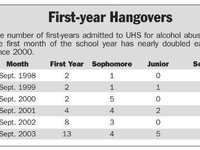Professor of the History of Science Everett R. Mendelsohn, who sat on the Leaning Committee last year, said he hopes the committee will focus first on the aspects of the social scene at Harvard that may lead to irresponsible drinking. When it comes to alcohol, an examination of Harvard’s culture should come before questions of discipline, he said.
“I’m less interested in discipline and rules in this case than I was in the case of rape, because in this case it’s often self abuse. We need to focus on cultural and structural self-education,” Mendelsohn said.
Undergraduate Council President Rohit Chopra ’04 said he’d been assured that the committee would not focus on discipline nor on the Administrative Board.
“I’m pleased that the University is admitting its failure in providing proper treatment to those in need,” said Chopra, who added that he hopes the administration will also look into improving its resources for treating mental health problems.
Both Mendelsohn and Chopra said that students need to learn how to help one another and to form communities with better attitudes towards alcohol consumption.
“People need to know how to identify whether their friends have drinking problems,” Chopra said. “We need to know when it’s a problem and when to intervene.”
While Badaracco said he does not know what the committee will recommend, he said that it will likely zero in on social groups, Houses and UHS in its investigation.
“We want to make sure we turn over every rock,” Badaracco said.
Hyman said he thinks that one result of the committee’s work may be a variety of more effective education programs, some perhaps aimed at certain high risk groups, such as social clubs and sports teams. Another possibility is a revamped information session for first-years during Freshman Week, he said.
“[Students] want to go out and have fun and be silly, but they feel like they need alcohol as an excuse,” Shirley L. Hufstedler ’07 said. “They don’t feel like it’s acceptable to be silly, energetic and do party-type things without alcohol as an excuse.”
Hyman said that student input will be crucial to the committee’s success.
“Students generally come here with some idea of alcohol. They don’t want to hear the same thing about the risks of alcohol,” Hyman said. “We need to know what’s credible and what’s not. We need to hear from students about whether UHS has been effective in asking about drinking and finding treatment.”
Gross said that he, too, has been trying to get a better idea of student life. In mid-September, he said took a walk—unnoticed—through the Quad on a Saturday night to observe the social scene firsthand.
Educating Within the Law
Massachussetts State Law, however, may constrain free discussion of the issue on campus. Since the drinking age is 21, administrators cannot advocate moderate drinking in a revamped education program, since many students are underage.
Read more in News
Black Female Alums Celebrate Third Decade













